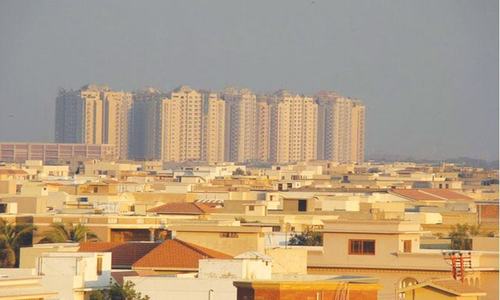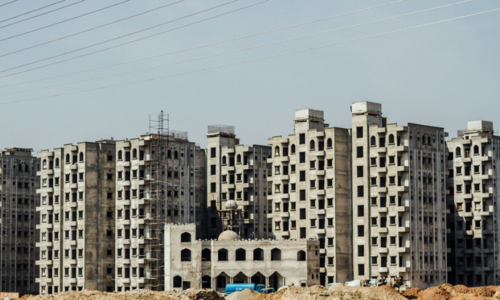
In a time of increasing inflation and devaluation of the Pakistani rupee, the government is looking for more taxes but it seems like there is no solution, instead of going after tax evaders, the government is penalising the existing tax payers. How valid is this claim?
The urban real estate valuation in major cities in Pakistan has expanded fundamentally during recent years which ought to be in direct proportionality to purchasing power. This was the case in thickly populated cities like Bombay, Hong Kong and so forth. But the rental yield stands at 3.5 per cent to 5pc.
An analysis of data from the ministry of planning, the State Bank of Pakistan (SBP), the Pakistan Stock Exchange (PSX), and Zameen.com found that the total value of assets in Pakistan, excluding the value of the commercial real estate and private businesses, is abnormally overvalued. It is estimated that over $19 billion sailed into empty urban plots in 2021.
The contribution of the real estate sector to GDP has been more than 9pc per cent. According to the 11th five-year plan (2013-18), Pakistan’s housing shortage is assessed to be about nine million units. This implies that more than 33pc of 32m families in Pakistan do not have sufficient housing while the valuation of residential land is increasing abnormally.
But the figures show a different story. Based on Zameen.com’s Property Price Index of January 2022, the valuation stands at Rs8,104 per square foot which was Rs7,364 six months ago.
It is estimated that over $19 billion sailed into empty urban plots in 2021
This abnormal valuation is further classified by SBP by comparing DC (deputy commissioner) rate, Federal Board of Revenue (FBR) rate and market rate of one Kanal plot in Lahore, Islamabad and Karachi which estimated a difference with a gap of between two to five times.
This may suggest that urban real estate is way too overvalued. This number should ideally be around five times the GDP if we want to be at an efficient asset utilisation level, meaning that the overall asset allocation of the country is optimised for income generation in the country. This is absolutely not the case in Pakistan, as may be evident.
The year 2021 was truly an outlier. The total amount of money that flowed into empty urban plots of land was $19bn last year, which is higher than the previous four years combined. The numbers and estimates are proof that we have a lot of overvalued or unaccounted for capital invested in this sector. The value is not transferred to actual home-seekers.
FBR’s guidelines ie restriction on non-filers and necessary enlistments when purchasing a property worth more than Rs5m and high duties on transfers have discouraged investors. Albeit, economic business sectors are encountering unpredictability, it’s not the financial indicator one may think. Yet, as a venture choice, a myth prevails that real estate rakes in boatloads of cash. In many nations where monetary business sectors are not assuming a critical part in financial development, the real-estate sector steps in.
But in Pakistan, this sector didn’t step in to take the charge mainly due to over-regulation by the government and the FBR. Comparing the KSE-100 index and housing price index from 2011 to 2019, it can be seen that the cumulative return on the housing price index was higher than the latter for 3 years only. In the same period, the KSE-100 index grew by 230pc as compared to a 147 per cent increase in prices of real estate.
Since 2018, the real estate market has survived on its knees mainly because it has confronted monetary, financial, political difficulties, various strategy issues and the absence of certainty. It scarcely figured out how to endure the previous downturn, fundamentally because of enormous investments by Pakistanis living abroad. The icing on the cake is the devaluation which made property investments less expensive for overseas Pakistanis.
All these factors add up and the vacuum left by the real-estate sector explains the recent rise of property tech companies in Pakistan. They started with paid listings on sites such as Graana and Zameen, which only touched the top of the buyer decision journey funnel. The bottom of the funnel, where payments are controlled, is where the real money and data insights lie.
“Blockchains remove the need for there to be a trusted third-party guaranteeing the sanctity of information — you do not need a central bank to issue reports on the validity of transactions on the Bitcoin or Ethereum blockchain,” said Uzair Younus, director of the Pakistan Initiative at the Atlantic Council. “To make this possible, blockchains rely on modern cryptography, which is why tokens issued on public blockchains are often referred to as cryptocurrencies or crypto assets. These tokens help secure, validate, and record transactions on public blockchains.”
While digitalisation, blockchains, and tokenisation is the next big thing, will regulators assist and developers integrate? Hence the need to further develop this new technological solution.
Government should bring an all-around organised, straightforward and unified framework for financial backers in contrast to the current muddled techniques of documentation and dubious legitimate legal support. The Securities and Exchange Commission (SECP) should look after the rules in regards to obtaining land, possession and all property specialists and ventures which ought to be registered.
If the SECP understood the trickle-down impact of this solution, real estate investments will become yet more secure and inclusive in the future. The nation can thrive with a solution that provides complete visibility of development progress, funds utilisation and a ledger of owners on a digital portal.
Published in Dawn, The Business and Finance Weekly, January 21st, 2022













































